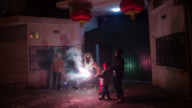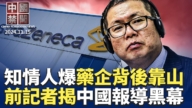【新唐人2013年10月02日訊】近來,中共領導人習近平對當今中國社會道德淪喪、笑貧不笑娼的風氣深感憂心,他希望通過發揚儒家、道家和佛教等中國的傳統文化,來遏制腐敗的蔓延和滋生,彌補中國社會的「道德真空」。但是有人質疑,無神論的中共政權,倡導神、佛的傳統文化,是別有用心,是企圖轉移普通民眾的視線,和他們對貪官腐敗與霸佔土地等強權的不滿。
根據英國《路透社》報導,習近平認為,因為中國的經濟發展和全民以致富為榮,造成了中國社會的「道德真空」,道德準繩缺失的價值觀體系,為貪污腐敗提供了沃土,因此反腐運動只能治標,而不能治本。
消息人士說,習近平希望通過發揚儒家、道家和佛教等中國的傳統文化,遏制腐敗的蔓延和滋生。
美國南加州大學公共政策博士葉科:「這種道德缺失並不是因為經濟發展的緣故,你看南韓、台灣,他們也是經濟發展了,但是為甚麼道德沒有缺失呢。這實際上是因為中共對傳統文化的破壞,中共無神論的宣傳,對傳統文化的抹黑摧殘,對各種信仰團體打壓。」
時事評論員任百鳴:「我覺得,與其說是恢復傳統文化來救中國,不如看看誰是真正破壞中國傳統文化的那些人,把這些人繩之以法,我覺得才是當務之急,才是有一個明確的態度,這樣才有可能走下一步。」
中共最高法院今年3月公布報告顯示,2008年至2012年,大約有14萬3000名政府官員被控貪腐和瀆職,平均每天有78人。
葉科:「現在整個社會危機四伏,它就需要別的手段來繼續的欺騙百姓,包括這個傳統文化,它實際上是為了想利用來解決中共自己腐敗問題,它是為了中共的政治目地服務,為了繼續維持共產黨的專制統治。」
在中國的《憲法》中,明確規定了民眾享有宗教信仰的自由。而中共政權從1999年開始,全面禁止民眾信仰「法輪功」,對於一切活動公開的法輪功修煉者,進行殘酷迫害,多少人被捕入獄,這是在其他國家看不到的現象。
美國的「人權觀察」組織資深分析員林偉(Nicholas Bequelin)說,「中國的宗教必須要為國家服務,中國雖然泛泛的規定了宗教自由,但容許自由到何種程度,令人質疑。政府是一手寬鬆,一手鎮壓。」
美國「南加州大學」公共政策博士葉科強調,在中國,只要是有可能威脅到中共統治地位的宗教勢力或團體,不管事實如何,中共一律鎮壓。
葉科:「在傳統文化和信仰問題上,不管現任高層怎麼說,他們如何對待法輪功就是一塊基本的試金石。你想,只要對千百萬法輪功學員迫害、對真善忍信仰的迫害還在持續,那中國社會的道德重建,傳統道德的恢復,根本就是空談。」
在信仰多元化的國家,相對也是民主性較高的國家,他們不僅尊崇傳統信仰,也能敞開胸懷接受外來的宗教思想。而信仰「無神論」的共產黨,與中國傳統的文化和信仰完全格格不入,中共善於用暴力製造恐懼,用謊言蠱惑人心。
1941年,美國總統富蘭克林‧德拉諾‧羅斯福,在美國國會上,建議成立「聯合國」。他在發言中提出了人類具有四個自由的概念,其中包括「信仰自由」,後來被明確為「宗教自由」。
根據《公民權利和政治權利國際公約》第十八條第一項規定:人人有思想、良心和宗教自由的權利。雖然中共政權於1998年10月5號,在紐約聯合國總部,簽署了《公民權利和政治權利國際公約》,但是直到今天,中共人大還沒有批准這份公約。
採訪/陳漢 編輯/黃億美 後製/郭敬
Anti-corruption fail? Xi Jinping turns to traditional culture
Recently, the Chinese leader Xi Jinping is feeling deeply
worried about the moral decay of today’s Chinese society
and the poverty is more shameful than prostitution.
Xi has tried to promote Confucianism, Taoism, Buddhism
and other Chinese traditional culture to curb the spread
and breeding of corruption, and to turn Chinese society
into a “moral vacuum."
However, it was questioned whether the atheistic communist
regime has an ax to grind in advocating God
and Buddha’s traditional culture.
They are attempting to divert the general public’s attention
and dissatisfaction from corruption and appropriating the land.
According to the British Reuters, Xi Jinping thinks China’s
economic development and glory in getting rich
resulted in a Chinese society “moral vacuum."
A system with a missing moral dimension can provide
a fertile ground for corruption.
Thus, the anti-corruption campaign can only scratch
the surface.
The source said Xi Jinping hopes to promote Confucianism,
Taoism, Buddhism and China’s traditional culture to curb
the spread and breeding of corruption.
University of Southern California, Public Policy, Dr. Ye Ke:
“Economic development is not the reason for moral flaws.
You can tell, Korea and Taiwan also have economic growth,
but why don’t they have moral flaws?
The moral flaws are because of the CCP’s long-term
continual destruction of traditional culture, especially
the propaganda of atheism and the suppression
of various faith groups."
Commentator Ren Baiming: “I think it’s better to find out
who are the exact people destructing the traditional Chinese
culture than to restore traditional Chinese culture
in order to rescue.
It needs to bring these people to justice;
then it’s possible to take the next step."
This year, the CPC Supreme Court report revealed that
in March from 2008 to 2012, there were about 143,000
government officials accused of corruption
and dereliction of duty.
The daily average was 78 people.
Ye Ke:"The whole community is loaded with danger.
It is necessary to continue to deceive the people
with other means including traditional culture.
They are using traditional culture to solve corruption
in the CCP and to serve the CCP’s political purpose under a tyranny."
China’s “Constitution" expressly provides for the freedom
of religious belief.
The communist regime has totally prohibited public faith
in Falun Gong since 1999.
They banned all public activities
of Falun Gong practitioners.
Many practitioners are suffering brutal persecution
and are put in jail.
You can’t find the same situation in other countries.
Senior analyst Lin Wei (Nicholas Bequelin),
Human Rights Watch, American division,
said religion must serve the country in China.
It’s questioned to what extent religious freedom
can be allowed.
Government loosens in one hand and suppresses in the other.
Dr. Ye Ke, U.S. “University of Southern California, “Public
Policy stresses religious groups will all be suppressed as
long as they are likely to threaten the CCP’s dominance;
no matter what the truth is."
Ye Ke: “The way they treat Falun Gong is a touchstone in
matters of traditional culture and faith, no matter what the
current senior incumbent says.
The moral restoration and reconstruction is all empty talk
as long as the persecution of the millions of Falun Gong
practitioners and the faith of Truthfulness continues."
Religiously diverse countries also have a relatively high
level of democracy.
They not only respect traditional beliefs, but also openly
accept foreign religions.
Believing in atheism, the CCP is good at using violence
to create fear and seducing the people with lies
which goes against the grain of traditional culture and religion.
In 1941, U.S. President Franklin Delano Roosevelt proposed
the establishment of the United Nations in the U.S. Congress.
His speech presented the concept of four human freedoms,
including the freedom of religion,
which was later explicitly defined as religious freedom.
According to “Civil and Political Rights, the International
Covenant," the first paragraph of Article XVIII states that
everyone has thought, conscience and religious rights.
Although the Communist regime signed the “Civil and
Political Rights, the International Covenant" at the United
Nations Headquarters in New York on October 5th, 1998,
the CCP Congress has not yet ratified this convention.




























